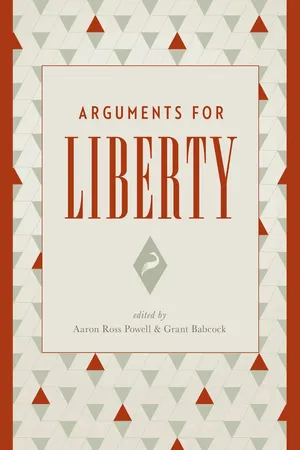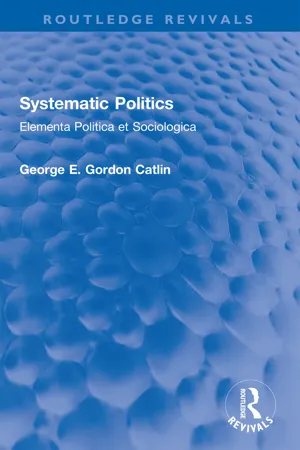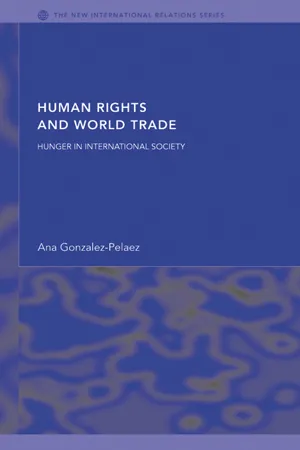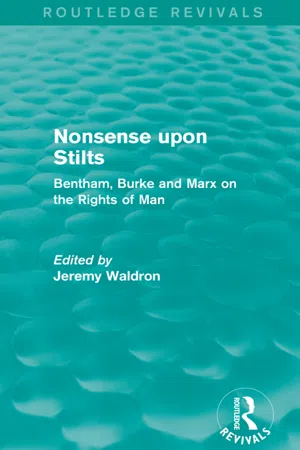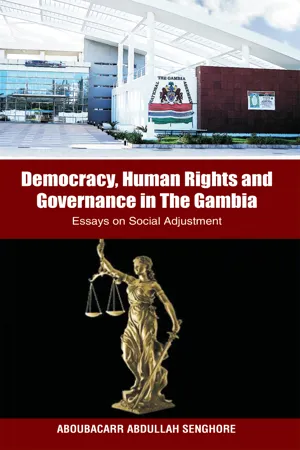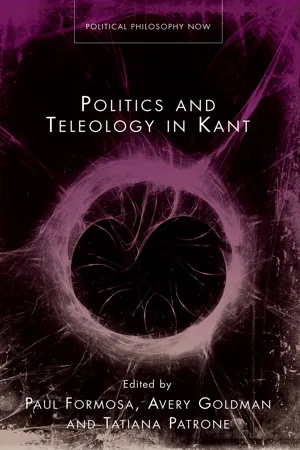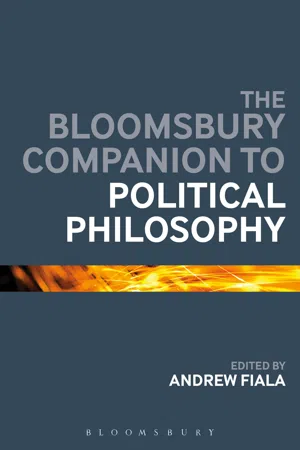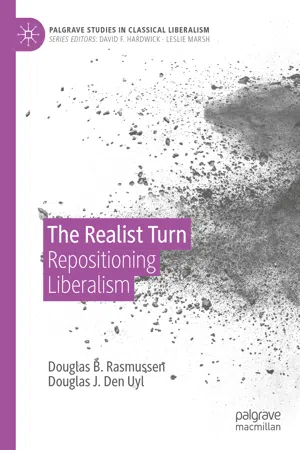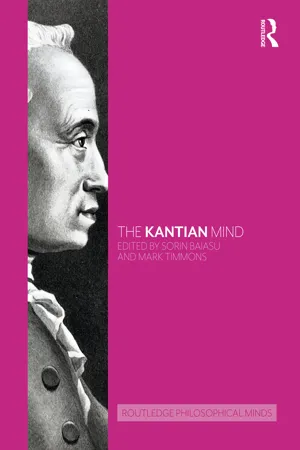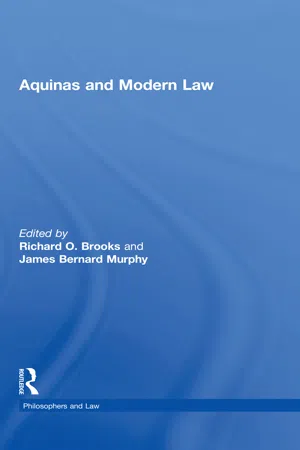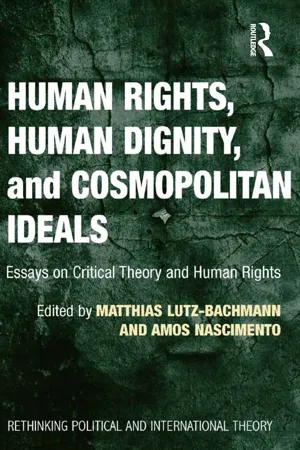Politics & International Relations
Natural Rights
Natural rights are fundamental rights that are believed to be inherent to all individuals by virtue of their humanity. These rights are considered to be universal, inalienable, and not contingent upon the laws or customs of any particular society or government. They include rights such as life, liberty, and property, and are often seen as the foundation for modern concepts of human rights and civil liberties.
Written by Perlego with AI-assistance
Related key terms
11 Key excerpts on "Natural Rights"
- eBook - ePub
- Aaron Ross Powell, Grant Babcock(Authors)
- 2016(Publication Date)
- Libertarianism.org Press(Publisher)
Natural RightsEric Mack Individuals have rights, and there are things that no person or group may do to them (without violating their rights).—Robert Nozick, Anarchy, State, and UtopiaIntroductionNatural Rights are moral claims that each individual has against all other persons and groups. Natural Rights allow each individual to demand that all other individuals and groups not subject her to certain untoward treatment—not subject her, for example, to being killed, enslaved, or maimed. Natural Rights do not arise out of the decrees of political authorities or calculations of social interests or through the particular processes by which individuals may acquire specific property rights or contractual rights. Natural Rights are our original rights—rights that each individual possesses against all other agents, unless those rights have been waived or forfeited. If there are such Natural Rights, they must be grounded in some morally seminal feature of each person.Moral rights—both natural and acquired—are absolutely central to political philosophy. For, since individuals may demand that their rights be respected, individuals (or their agents) may use force to ensure compliance with their rights; and political philosophy is about the acceptable use of force.In this chapter, I explain and recommend the Natural Rights approach to political philosophy. I will dispel the idea that there is something mysterious or spooky or old-fashioned about this approach. I indicate how this approach captures certain of our most central moral insights and how it connects with further moral insights about the separate importance of each individual and each individual’s well-being. Moreover, I will indicate how the Natural Rights approach that I will be articulating has strongly libertarian implications. Indeed, most of the powerful articulations of classical liberal and libertarian doctrine have issued from Natural Rights theorizing—from the founding father of classical liberalism, John Locke, in the 17th century to the most highly regarded libertarian philosopher of recent decades, Robert Nozick. - eBook - ePub
Systematic Politics
Elementa Politica et Sociologica
- George E. Gordon Catlin(Author)
- 2021(Publication Date)
- Routledge(Publisher)
Political theorists tended, with a free hand, to distribute Natural Rights, inalienable and indefeasible, around according to their taste and partisanship, whether of 'private property' (which had earlier been denied by many classical Natural Law writers and by those Patristic writers who held property to be fundamentally a trust) or of 'the pursuit of happiness.' There was also a natural right 'to think,' (that is, to go through the mental process) which, as Hobbes said, since it could never be denied, was perhaps scarcely worth asserting. Professor Paul Weiss, in a recent book (Our Public Life, pp. 63-4) has provided an abstract and singularly full catalogue of such rights, including the right to "believe,' to 'enjoyment,' to 'existence,' and even to 'travel,' the right of 'consumption,' 'the body,' 'rebellion,' and 'thought,' and the right of freedom from 'want.' It may, however, be more prudent to restrict ourselves to recent historical instances. There have been contemporary laudable endeavours, while not mentioning 'natural' law or rights, to establish Laws of Civilization and Humanity, so little abstract that under them men may be hanged, and also, from the United Nations or the Council of Europe, to issue Declarations of Human Rights. It seems to be a legitimate criticism that some of the national representatives accredited to draw up these Declarations, in what is one of the most notorious fields of political rhetoric, had no especial qualifications either as lawyers or as philosophers. For example, Sir Charles Dukes, late Lord Dukeston, the British representative, was a veteran trade unionist, an admirable man, and a good democrat; but it is open to doubt whether he had ever consciously considered a philosophical problem as such (in which he had no training) in his life - eBook - ePub
- Ana Gonzalez-Pelaez(Author)
- 2004(Publication Date)
- Routledge(Publisher)
This section recounts when the concept of basic rights appeared in the political arena and under what historical circumstances. It does not develop a theory of basic rights or explore its philosophical consistency.Basic rights are a set of rights, within the wider human rights discourse, whose enjoyment is essential to the enjoyment of other rights. ‘When a right is genuinely basic, any attempt to enjoy any other right by sacrificing the basic rights would be literally self-defeating, cutting the ground from beneath itself … basic rights specify the line beneath which no one is to be allowed to sink’ (Shue, 1996: 19).The term can be traced back to its origins as a moral idea through a study of the conception of the individual from the Greek Stoics to the Middle Ages and the Renaissance. However, it is not until the French Declaration of the Rights of Man (1798) that the definition of fundamental principles appeared in a legal framework. This declaration adumbrated the modern idea of basic rights through Natural Rights theory, according to which rights are defined on the basis of humanity, and not according to membership of a particular political community. The Natural Rights (or rights of man) tradition protected fundamental areas that political agreements should not modify: life, property, safety and resistance to oppression (Vincent, 1986a: 14, 15).Together with this declaration there were other landmarks such as the British Bill of Rights (1689) and the American Bill of Rights (1791), whose influence on the idea of basic rights should not be underestimated. Although these examples promoted developments within countries, ‘concern by one country for the welfare of individuals inside another country met many obstacles’ (Alston and Steiner, 1996: 116). Even if these declarations were limited to the national realm and subject to particular political environments, other events started to take place slowly in the international arena: in the nineteenth century, European and American states abolished slavery and the slave trade on the basis of protection of human dignity. States began also to pursue agreements to make war less inhumane, to safeguard prisoners of war and civilian populations (ibid.: 114). - eBook - ePub
Nonsense upon Stilts (Routledge Revivals)
Bentham, Burke and Marx on the Rights of Man
- Jeremy Waldron(Author)
- 2014(Publication Date)
- Routledge(Publisher)
1 Natural Rights in the seventeenth and eighteenth centuries DOI: 10.4324/9781315742809-2I
It is easy for us to take the idea of human rights for granted. But to understandit properly, we need to see it in the context of the ideas to which it has beentraditionally opposed. In its classic form the theory of Natural Rights may beseen as an attack on two quite different approaches to the defence of politicalabsolutism: it is a response to the theory of natural hierarchy, and it is aresponse to theories of contractual subjection to absolute authority. Both theseresponses are found in the political philosophy of John Locke, and the argumentset out in the Two Treatises of Government will serve us, as itserved the revolutionaries of the eighteenth century, as the paradigm of a theoryof Natural Rights.1The Lockean philosophy can be viewed, first, as a response to contemporary claimsabout the divine right of kings and, more generally, to all theories of thenatural ordination of political authority. Suppose human beings are taken to bethe creatures of a God who has set up a certain order for the world in which theyare to live; suppose too that this order can be perceived by them either throughthe use of reason or through divine revelation or both; and suppose finally thatboth reason and biblical revelation indicate the indispensability of politicalauthority in human affairs, given the nature of man. Then the question arises: onwhat basis is this authority to be constituted? Has our Creator Himself institutedthe authority needed for human life, designating certain individuals (or certaintypes of individuals) as natural rulers and placing all others in naturalsubjection to them? Or is this something He has left for us to work out on ourown? - eBook - ePub
Democracy, Human Rights and Governance in The Gambia:
Essays on Social Adjustment
- Abdullah Senghore(Author)
- 2018(Publication Date)
- CENMEDRA(Publisher)
As the above discussion of the nature of rights reveals there can be no single universal and comprehensive definition for the concept of human rights. The various philosophical perspectives just highlighted above stand to contradict one another. So to give a single definition comprehensive enough to be accepted by all is out of the question. Similarly, the continuing debate and controversy between the theories of universality and cultural relativism over the scope and relevance of human rights is another factor ruling out the possibility of providing such a definition. While any definition by the proponents of the universality theory would stress the universal, indivisible, interdependent and interrelated character of human rights and that they have to be placed beyond the limits of domestic jurisdiction, the cultural relativists would advance a definition which emphasizes the need to consider human rights in their ideological, regional and national context and on the principle of respect for and non interference in the internal affairs of a sovereign state. However, given that the concept or term “rights” is used to describe a variety of relationships the following description of the concept may be recognized (although it sounds influenced by the theory of Natural Rights): Human Rights are those fundamental values inherent in every individual human being on the basis of humanity and recognized by law both domestic and international.Human rights in this way mean three things, namely (i) immunities, this refers to civil and political rights which protect against encroachment by the government; (ii) privileges i.e. economic, social and cultural rights for the realization of which affirmative action by the government is necessary; and (iii) power to create a legal relationship. This is a reference to the formal power of the state to pass laws and regulations in connection therewith. As for Islam, just like the case in the conventional sense, human rights define the relationship between the state and the individual and that they serve to limit the power of government. What has become very clear out of this precise exposition of the nature of rights in Islam is that the current phenomenon of rampant violation and sheer disrespect and disregard of human rights in many parts of the Islamic world is purely due to attitudinal rather than doctrinal problems. In fact, it is no secret that most Muslim countries of contemporary times do not follow or apply Islamic law. So Islam has got nothing to do with what is happening there.Furthermore, I have already indicated that the Islamic approach does not proceed from a position of duality between individual and state interests. So the controversy we have seen in the conventional approach will not apply in an Islamic system, because if the government does its duties properly, the rights of the individuals will receive due protection. Although some contemporary scholars have attempted to define the concept of human rights in Islam, many of such definitions are not comprehensive perhaps because they overlook the fact that this concept has to be traced in the concept of hukmshar’ī i.e. the communication of the law giver conveyed in the form of a command or a prohibition which regulates the conduct of every legally responsible individual or mukallaf. Thus, hukmshari is a major concept containing a variety of other concepts including that of rights and obligations. Both the command and prohibition constitute the mandatory rules of Shari’ah which may require a certain action, or give a choice whether to do or not. Actions so required may be obligatory (wajib), recommendable (mandūb), permissible (mubāh), disapproved (makrūh) and prohibited (haram). If the enforcement of human rights requires affirmative action they may have to be fitted into one or perhaps all of the first three categories. But if they are to be realized by means of negative action then the latter two criteria may be applied i.e. the obligation to preserve life will fall under wājib or mandatory obligation, whereas the prohibition of destroying life falls under haram or prohibition.32 - eBook - ePub
- Patrone Tatiana, Paul Formosa, Avery Goldman(Authors)
- 2014(Publication Date)
- University of Wales Press(Publisher)
a priori ideas of human reason. The priorities of natural right appear in the first instance to stand in marked contrast to the ordering of events in nature and it is only over time that nature accommodates itself to moral ends. External freedom, which is the prime requisite of natural right, is not immediately found in all human societies. External freedom has first to be brought about by removing the human species from a primitive, barbaric condition and then by gradual political reform creating a republic. Thus, although freedom is an innate right, we are not necessarily born into a society where it is realised. What is natural to the human species – to be treated with dignity – has in fact to be acquired.If the ‘guarantee’ of Toward Perpetual Peace disturbs the picture of a triadic, existing and ever-present harmony of God, nature and man on which traditional natural law relies,4 then the final two appendices confirm a picture of natural law as a secular, normative enterprise similar to that advocated by d’Entreves. After setting out the principles of right that would provide the framework for attaining perpetual peace in the preliminary and definitive articles Kant, at the end of the treatise, deals with a question that is highly significant for him and unless dealt with affirmatively could stand in the way of the achievement of his aims. The question concerns the relationship between morality and politics. Improvement can only come about if the two are seen as working in harmony, and if the mechanism of nature is not permanently seen as standing in the way of their cooperation. In the first appendix he attempts to show that arguments that attempt to prove their disharmony are inconsistent and contradictory, and in the second appendix he shows how morality and politics can be brought fully into agreement by implementing the ‘transcendental concept of public right’ (ZeF - eBook - ePub
- Andrew Fiala, Andrew Fiala(Authors)
- 2015(Publication Date)
- Bloomsbury Academic(Publisher)
But there is a problem. Anyone’s view on whether a particular theory has given a satisfactory answer to the question which rights we have obviously depends on one’s view of what counts as a satisfactory answer. Take, for example, contemporary libertarian Natural Rights theories. Libertarians typically deny that we have any innate moral right to such things as basic health care or elementary education. For some political theorists, this in itself serves to show that the libertarian is not talking about (international) human rights. The libertarian, however, is unlikely to be impressed by this, for she is unlikely to share the political theorist’s view of the relation between HR and IHR. Most libertarians would condemn the practice of levying tax on citizens in order to finance a system of universal health care or education as a violation of the property rights of the wealthy. This is not even a case of a conflict of rights—the rights of property owners on the one hand and the rights of the needy on the other—since the libertarian denies that the needy have moral rights to such provisions. To the extent that IHR stimulates states to finances systems of universal health care through taxation, the libertarian will view it as complicit in the large-scale violation of the human rights of property owners rather than attempting to protect human rights. If the political theorist wants to insist that the libertarian is talking about Natural Rights rather than human rights, she may well do so but it will seem little more than a word game to the libertarian. After all, the crucial function of libertarian Natural Rights is to distinguish legitimate from illegitimate uses of government force, which is also the most important function of human rights for the political theorist - eBook - ePub
The Realist Turn
Repositioning Liberalism
- Douglas B. Rasmussen, Douglas J. Den Uyl(Authors)
- 2020(Publication Date)
- Palgrave Macmillan(Publisher)
© The Author(s) 2020 D. B. Rasmussen, D. J. Den Uyl The Realist Turn Palgrave Studies in Classical Liberalism https://doi.org/10.1007/978-3-030-48435-4_1Begin Abstract1. Whence Natural Rights?
Douglas B. Rasmussen1andDouglas J. Den Uyl2(1) St John’s University, Jamaica, NY, USA(2) Liberty Fund, Indianapolis, IN, USAIndividual rights are the means of subordinating society to moral law. Ayn RandKeywords Natural Rights Liberal political principles Jason Brennan David Schmidtz Jacob Levy John Tomasi Realist contextEnd AbstractIn his essay “The Poverty of Natural Rights Libertarianism,” Brink Lindsey opens by telling a story about how libertarianism has long been rooted in Natural Rights, specifically those of self-ownership and property .1 Lindsey might also have noted that Natural Rights were at the core of classical liberalism, at least the classical liberalism that followed the Lockean tradition . While this lack of notice might suggest that Natural Rights as they are understood in the classical liberal tradition are apparently not as impoverished as those advocated by libertarians , Natural Rights are not supposed to be the sort of things that can be given different understandings under different ideologies or schools within an ideology.2 As Jefferson noted, these rights are supposed to be “self-evident ” and “unalienable.” If so, then the “poverty” about which Lindsey speaks must be due to the libertarianism , rather than the Natural Rights,3 and “Natural Rights” has become adjectival, identifying a type of libertarianism , rather than standing on its own as a moral - eBook - ePub
- Sorin Baiasu, Mark Timmons, Sorin Baiasu, Mark Timmons(Authors)
- 2023(Publication Date)
- Routledge(Publisher)
Toward Perpetual Peace, where he speaks ofthe inhospitableness of the inhabitants of the sea coasts (for example, the Barbary Coast) in robbing ships in adjacent seas or enslaving stranded seafarers, or that of the inhabitants of deserts (the Arabian Bedouins) in regarding approach to nomadic tribes as a right to plunder them [as being contrary] to natural right.(EF 8: 358)He deploys the term to condemn what he regards as hostile and lawless behavior which arises in parts of the world to which civil society has not extended. In using the term here Kant wants to tap into a widely felt sense of injustice amongst all people when they witness extreme unfairness and disregard for morality of this kind. He is happy to take advantage of the general connotations of the term in his day, which derive from the natural law tradition in philosophy and jurisprudence. Yet, on the other side, Kant’s more specific, technical use of the term in his Doctrine of Right tends towards a disregarding of the conventional uses of the term and an absorption of it within the framework of his own critical philosophy. He takes no precursor in political philosophy as a full authority in the field, relying on his own judgement in taking his own philosophy beyond the previously received wisdom.As a systematic dimension of Kant’s critical philosophy, natural right is dealt with in the Doctrine of Right of the first part of the Metaphysics of Morals (first published in 1797). Right requires external coercive laws and they may be of two kinds: natural laws and positive laws. Kant describes natural laws as the type of external laws that can be recognized as obligatory a priori by reason even without external law giving (MS 6: 224). Thus even in the absence of legislation from a state, natural laws should be obeyed without question by human individuals. There can be neither legal nor moral grounds for disregarding them even where there is no state to apply coercion. By contrast, those laws thatdo not bind without actual external lawgiving (and so without it would not be laws) are called positive laws(MS 6: 224). For Kant, it is possible to conceive of a system of external laws that contains only positive laws, but then a natural law would still have to precede it, which would establish the authority of the lawgiver - eBook - ePub
- James Bernard Murphy, Richard O. Brooks(Authors)
- 2017(Publication Date)
- Routledge(Publisher)
I Me Mine, on LET IT BE (Harrisongs, Ltd. 1970)).95 Zuckert, New Republicanism, supra note 67, at 281-85.Passage contains an image
Joseph Boyle8 Fairness in Holdings; a Natural Law Account of Property and Welfare RightsI Introduction
In this essay I will try to develop a natural law justification of welfare rights. The justification I will undertake is from the perspective of Catholic natural law, that is, the strand of natural law that has been developed theoretically by Roman Catholic canonists, theologians, and philosophers since Aquinas, and affirmed by Catholic teachers as the basis for most moral obligations. Catholic natural law is, therefore, natural law as developed and understood by Catholics or others respecting Catholic traditions of inquiry. It is not, however, primarily or exclusively natural law for Catholics, since the very idea of natural law includes the conviction that it is accessible in principle to anyone.By welfare rights, I mean a species of political rights. I understand rights to be the grounding of duties in the interest or welfare of other people. I understand political rights to be legally recognized and established claims by members of a political society on that society as a community, whose leaders and members have duties based upon the interests of those who have the rights in question. Welfare rights are not simply the claims of some and the duties of others to forbearance, but claims and duties to provide or guarantee the provision of a fair share of those instrumentalities or empowerments important for living good human lives: these include things like education, housing, health care, and welfare support for the elderly, the unemployed, and the underemployed. There are various ways for a political society to guarantee that such needs are met, and various ways to organize the provision of assistance to the needy. These ways of giving legal form and social reality to the welfare rights of the needy are themselves, of course, subject to moral scrutiny. However, the thrust of this essay is to establish the moral grounds for the political establishment of welfare rights themselves, not for any particular social arrangement that implements these rights. In particular, I am not arguing that government should presumptively be the provider of assistance for the needy; Catholic natural law suggests that voluntary associations should play this role whenever possible. My argument is, therefore, for the conclusion that political society should use its legal authority to guarantee that the welfare rights of its needy members are recognized. - Matthias Lutz-Bachmann, Amos Nascimento(Authors)
- 2016(Publication Date)
- Routledge(Publisher)
thirdly , the postulate—in the name of social justice—that the political communities in which we live should be prepared also to positively promote the common good. The postulate concerning the orientation of political action for the common good transcends the boundaries of the political community and involves everyone else at least negatively, in such a way that certain basic goods that they need for their own lives cannot be denied to them if they are—in principle—available.These three juridico-political principles correspond to the three groups of human rights, namely the rights to individual freedom, democratic participation and social partaking. They are derived from the first ethical principle that demands an unavoidable recognition that all other human individuals are equal to “me” or to “us,” endowed with practical freedom and, therefore, “persons”; because these are the others who, like “me” or “us,” are equally beneficiaries of inalienable and pre-state rights. The function of such rights—when considered in relation to the legal system maintained by the state through coercion—consists precisely in protecting everyone against the arbitrary intervention of state power or against coercive laws. At the same time, this principle characterizes people positively as authors of a legal order that holds them together according to both the constituted rules of public law and their relation to those rules based upon which individuals interact with each other as private or political persons. By referring to these principles and rules I take up the thought introduced by Kant in his Metaphysics of Morals in terms of legal reasoning as the principle of “Exeundum ex statu naturali.”25 What Kant conceives here as the “contract” between interacting agents, that is the political order, bases its claim to validity on fundamental rights that are already recognized before the state grants individuals rights. These rights, in turn, can neither be legally produced by an original “contract” nor be ethically established by a consensus among interested individuals, but rather be recognized as already given through contractual agreement or consensus and as already recognized as inter-subjectively valid. In fact, “contract” and “consensus” already presuppose these original rights and can only come to expected results or enforcement if understood as a realization of these same rights. The normative insight established through the highest, first ethical principle precedes, therefore, the transcendental contractualism of Kant’s Philosophy of Law [Rechtsphilosophie
Index pages curate the most relevant extracts from our library of academic textbooks. They’ve been created using an in-house natural language model (NLM), each adding context and meaning to key research topics.
